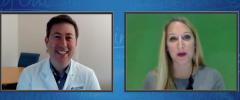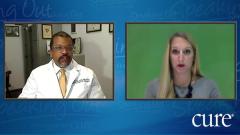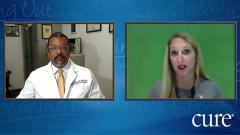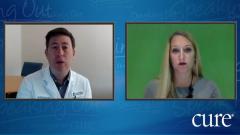
Learning About Lung Cancer Clinical Trials
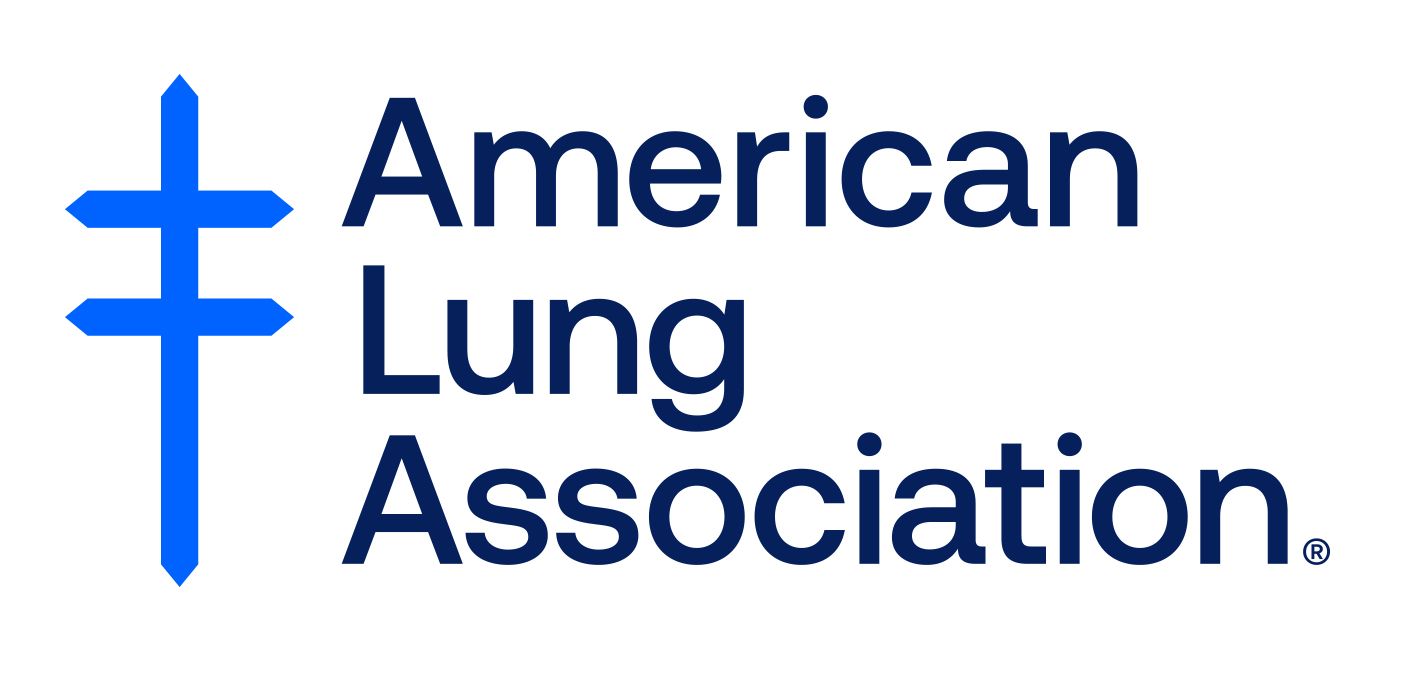
Kristie L. Kahl: To start, why would you say it's important for patients to consider joining a clinical trial?
Dr. Jacob Sands: Anytime I'm talking about clinical trials with a patient, it is entirely in the context of what is the best option for that individual. I think people come in or I witness people come in with various ideas and preconceived notions about what clinical trials mean. And there are a lot of people that are wonderful individuals that want to see progress. So you know, they say, “Oh, if there's anything I can do, that's going to help other people.” And I have to kind of bring them back, when we're talking about an option for you. This is deciding what's the best option for you. So we always hope that a clinical trial therapy is going to work really well for somebody. And if we can demonstrate that a drug works well, hopefully there are other people that will then benefit down the line.
As far as making a decision about clinical trials for an individual, it's all about what is the best option for that person. Any drugs that come up in a clinical trial are something that has been very promising in early development and other trials. So I do have patients where they came in, they were going to start a guy I'm thinking of was going to start chemotherapy with his oncologist, but he came in and had a genomic alteration, where there was a clinical trial available, it was a drug that we've been using for quite a while on that trial, it was more on the tail end, we'd seen great results with it. So I was able to say to him, “Hey, we have this drug on trial. It's something we're still studying, but I can tell you that it's been working really well for people.” And he continues now on this drug, where this is now an FDA approved drug at this point. But he's still on that trial. It's just been working so long for him. So clinical trials are all about what is the best option for that individual. And, and that's what we weigh out. But then, of course, you know, we're still studying those outcomes and side effects and such, but the conversation should always be focused on what's the best treatment option for that person.
Kristie L. Kahl: How can patients learn if they're even eligible for a trial?
Dr. Jacob Sands: So getting an opinion from one of the major academic centers is a way of getting a sense of what trials are available there. But community hospitals may have trials open, community hospitals, many do have trials open. And so there may be trials available in those centers as well, the larger academic centers are going to have more trials available and some of the earlier drugs. So that's in phase 1 or earlier development, some of the newest drugs. But there are so talk to your oncologist to consider an opinion and you are being seen at one of the major centers. You can also visit clinical trials.gov or lung.org has a site with information about clinical trials to get more information there as well. So there are various places, but I think sometimes when looking at all the stuff online, really then bring that to your oncologist to them to discuss that further.
Kristie L. Kahl: Are there any misconceptions that we can try to help negate and encourage patients to join a trial?
Dr. Jacob Sands: Yeah, this is a really important one to get out there. I think a lot of people have this impression, just like you're saying that trials are where they're going to get a great treatment or something that looks like a great treatment, or they might get no treatment at all with a placebo. And that's really not the way these trials are done. So at the bare minimum patients are going to be treated on the best standard of care treatment. Anything that includes a placebo would be the best standard of care treatment plus a placebo, or the best standard of care treatment plus something new that's being added to it. If somebody is going to go on a trial available, just a standalone new drug that compared our arm would be the best known standard of care treatment. So this idea that people might end up on just a placebo is really kind of an older idea. And I think it just harkens back to when we didn't have a lot of treatment options for cancer. But in this day and age, especially in lung cancer, we have an array of different treatments. And so placebo controlled, would not be just placebo alone.
Kristie L. Kahl: Can you just discuss the types of trials that we're evaluating these drug combinations or alone?
Dr. Jacob Sands: We go through phases. So, we have phase 1, when drugs are first being brought into the clinic. So this is a tip for a drug to be brought into a phase 1 trial. It means that it has been a standout, really promising drug, when looking at it in the lab, and in many cases, in testing in animals, showing that the drug is really effective in knocking back the cancer. And so, in phase 1, we're seeing what is a dose that is tolerable when treating humans. And we'll start with a very low dose, and then based on different things we're measuring, we'll increase that dose until we find the point at which it appears that it might be causing more in the way of side effects. And then we back it down. Now, that can happen in different ways. But that's essentially how phase 1 goes.
Phase 2 is where we say, “Okay, this drug has been well tolerated. And there's a sign in treating people that it looks like it probably works when we're seeing very promising results. But we need to see more results at the dose that really appears like it's the one to bring far, which is what is the one dose to further evaluate, or sometimes two doses, and then bring those forward and enroll more patients on that trial. So that's where we say, “Okay, this is well tolerated, it's promising.” So now people are being treated with this promising drug. And we collect more to see how effective it really is, if it's really effective in that those are often single arm studies. There can be phase two randomized studies where you’re on the experimental drug, or on the best standard of care and so that we have a comparator arm, sometimes it's just everybody gets enrolled, and ends up on that that experimental drug to see how effective it really is, and better understand the side effect profile. If it's very promising in that, then we say, “Okay, this really looks like a good drug. Now let's do a large trial, where we compare it to the best standard of care.”
And so sometimes the drug is so effective in a single arm study, that it does lead to FDA approval. And we've seen some of that this year with some of the targeted therapies for lung cancer. But in many cases, it goes to a large trial, where it's compared versus the best standard of care, to see if it really beats the best standard of care, and to then lead to FDA approval. Now, it's also important to mention that some clinical trials are with FDA approved drugs. So it may be a drug that we know works really well, where we say, “Gosh, this is so effective for metastatic cancer, for example, why don't we test it in earlier stages when we're really going for cure?” And so I have a trial that I'm leading in non-small cell lung cancer, where patients who get surgery and then they're getting the chemotherapy after surgery, we're adding an immunotherapy to see if it's more effective in that setting, because we know it is in this stage four metastatic setting, particularly for people that don't have a targeted therapy option.
Kristie L. Kahl: What would you say is your biggest piece of advice for a patient who's interested in joining a clinical trial?
Dr. Jacob Sands: Well, so one is talk to your doctor about this because this topic is much more broad than we have time to really discuss. Not everybody qualifies for treatment and a trial is not the best option for everybody either. If somebody had a recent other cancer, sometimes that can make them not a trial candidate or other things depending on the drug being studied as well. And then also be evaluated at a major academic center that's nearby. I'll tell you I have people where they do drive quite a distance to go on clinical trial, but that's only if the trial is really just so good. That it's really worth that drive. I have some people where I see them from where they live in Destin. And for anything else going on with them say, “Yes, we have this trial. But given all of these other factors that that are in play for you, maybe it's better to go on the best standard of care.” And then somewhere down the line, we can reevaluate for what's next one. One important point I do want to make sure that people understand also is that when you're starting treatment, or after that treatments not working, you're starting another treatment. If you have started a therapy, then it's very unlikely that you could go on to a clinical trial. At that time, you'd have to wait until the cancer has grown again. And I just want to get that out there. Because sometimes I see people come in where they say, “Oh, I've now been on this new this new therapy for a month. But what clinical trials could I do. I'd love to switch to something or look, and that's not an option.” So the clinical trials are something that decision point is really before you're starting that next line of treatment.


